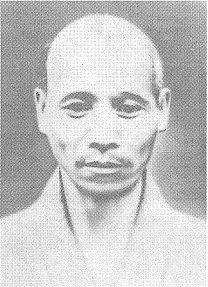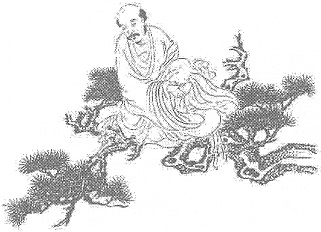|

金山活佛法名妙善,俗姓董,陝西終南山人。家甚富,父早喪。感人生無常,二十歲出家,次年受戒,即住金山。禪淨雙修,勇猛精進,奇異甚多,不勝枚舉。寮中無一物,冬夏一衲衣。行路飄然,而無音聲。毒蟲不侵,眾苦不畏。有物便捨,為善最樂。不愛名,不喜功,與人無爭,忍辱第一。見僧便拜,(具常不輕菩薩之精神。每夜深之際,山頂念佛,聲達雲霄。)以般若湯,醫治諸病,有緣者皆愈。光緒八年生,民國二十四年圓寂於仰光大金塔,僧臘三十四,世壽五十四。為真修實證之聖僧也。
這個金山不是美國舊金山,而是中國鎮江的江天寺,為什麼叫金山?因為唐朝法海和尚,當時還是個沙彌時,在湖南溈山學禪,到了鎮江,發覺在長江中間有個山,當時不叫金山,或者叫江山、或者叫海山。因為法海禪師在山上住,溈山老人在他下山時,祇給他八個半錢,說:「這八個半錢到什麼地方用完了,你就在那兒住。你還有這八個半錢,你就要各處走。」
法海由湖南溈山啟程,一路都不敢用這八個半錢。到處都是化齋吃飯,到吃飯的時候,就去化緣,人家給他一點飯吃就算了,捨不得用錢。等到他到長江要渡江去山上看時,擺渡船的船夫就向要八個半錢,多了也不要,少了也不要,所以他把錢用完了,就在金山住下。在金山什麼也沒有,也沒有人,只有一些樹木和石頭。可是他找到一個山洞,就住在洞裡。當時洞裡可能有猴子,所以山上的水果、草根、樹葉都不會少的。既然沒錢走了,他就在山上吃樹葉修行。晚上看見洞裡放光。一查發現洞裡有幾缸金子,不知是誰存在那兒的。大概是佛存的,菩薩存的,或者是鬼存的就不知道了。總之,他發現後,就用這幾缸金子造個廟叫江天寺。因為從山洞得到金子故叫金山。
江天寺的金山活佛是陝西終南山人,俗家姓董。他父親很有錢,住在終南山,也很有名氣及勢力。可是在他父親死後,他覺得人生無常。這麼有錢,身體這麼健康的人也會死的,遂於二十歲那年出家。第二年受戒,受戒後就到鎮江江天寺。江天寺在中國是專門坐禪的道場,參「念佛是誰」。他在那兒住了很久,學習參禪及念佛。他念佛和一般人不一樣,他念:「誰在念佛?誰在念阿彌陀佛?誰在念阿彌陀佛?」他在那兒住了幾十年,非常勇猛精進,所以靈異事情很多,一言難盡,不勝枚舉。
江天寺那麼多人,都是靠他化緣,來供養全寺。金山外面相信他的人很多。江天寺沒有米吃時,他出去轉一轉,米就來了;沒有柴燒了,他一跑到外面去,柴也來了。而自己房裡什麼都沒有,冬天、夏天,只穿一件衲衣,他有錢,就布施給旁人,自己什麼都不要。
也不像一般人求名、求利,做一點事就報功,好像某某人做一點對人有好處的事情,總也忘不了,總愛到處去講。真的人,什麼時候都是真的,都是往真的地方去做,為善最樂,他一做好事就高興得不得了,不像有些人儘做表面工作;一看到有人來了,就忙得不得了,一等沒有人就在那兒充殼子,甚至於睡覺。他是「不欺暗室,不愧屋漏」,他在暗室裡也不做虧心事,在房子裡最隱密處,也不會做犯規矩的事情,這是他的特長。
金山活佛的一生,毒蟲不侵。毒蟲不是單指蚊子、螞蟻之類,而是指蠍子、蜈蚣、毒蛇,也不咬他,他可以手上拿著蠍子、蜈蚣,而這些毒蟲都像他的好友似的。毒蜘蛛、毒蛇、兩頭蛇、三頭蛇、四頭蛇,他都不怕。他一生奇奇怪怪的事情很多。
在湖北,有一次,有九個人要皈依他,因為聽說金山活佛有道德,能給人治病。九個人要請他吃飯。吃飯時他把門關上說:「你們要皈依的人跪下,跪著等著張開嘴。」然後,他就混合了很多口水,黏痰給他們吃,結果九個裡,祇有一個姓賈的吃了它,他就收這一個皈依弟子,其餘的都不收,所以人稱這一個弟子叫「賈(假)菩薩」。
信徒供養他的東西,他一轉身就給了別人,從不佔為己有。一向最喜歡做善事、幫助別人。做了以後,也不誇功,更不好名。從來不願和人爭長短,別人再怎樣對不起他,他也從不記恨,忍辱的功夫可說已修到極點。看見出家人,便恭敬地頂禮,具有常不輕菩薩不敢輕視眾生的精神。每天深夜,只要他人在金山,他就一個人爬上山頂,高聲念佛。他的聲音中氣十足,響徹雲霄。將一聲聲莊嚴的佛號,送入睡夢中人的八識田裡。
他替人治病,用的是般若湯。而般若湯者,其實就是他的洗腳水、口水和黏痰。但很奇怪,只要和他有緣,對他有信心的,不管是什麼怪病,喝了這湯之後,一定馬上見效。他的新聞很多,說也說不完。
總而言之,人家做不到的事,他都能做。眾苦不畏,什麼苦他也不怕,越苦他越高興。所謂「忍人所不能忍,讓人所不能讓,吃人所不能吃,行人所不能行,做人所不能做。」他夠上這些名稱。
他在光緒八年出生,民國二十四年在仰光大金塔圓寂,活了五十四歲。據說仰光的馬路為了紀念金山活佛擴建了三呎。這是真或假的,我沒有仔細考察。這位妙善禪師,可說是末法之中真修實證的聖賢僧,可是當時認識他的人不一定很多。
待續 |
|
Essay:
The Living Buddha’s Dharma name was Miao-Shan (wonderful goodness). His lay surname was Dong. He was from Zhongnan Mountain in Shanxi Province. His family was well off but his father passed away when the Living Buddha was still very young. He realized the truth of impermanence and entered the monastic life at the age of twenty. The following year, he was ordained at Gold Mountain Monastery and went there to live. He was brave and vigorous in cultivating both Chan and the Secret Teachings. The extraordinary events associated with him are too numerous to count. His room was bare; he wore the same robe in both summer and winter. He walked lightly without making the slightest noise. Venomous insects could not harm him; no hardship daunted him. He gave away everything he had and delighted in doing good deeds. He had no interest in fame or being praised for his achievements. He contended with no one and excelled in being patient when humiliated. He bowed to monks whenever he saw them. (He embodied the spirit of Never Slighting Bodhisattva. He would recite the Buddha’s name on the mountaintop late at night and his voice would reach to the heavens.) He used ‘prajna soup’ to treat people’s illnesses. Anyone who had affinities with him would be cured. He was born in the eighth year of Emperor Guangxu in the Qing Dynasty and entered perfect stillness at the Great Golden Stupa [Rangoon, Burma] in 1933. He lived to be fifty-four years old, having been in monastic robes for thirty-four years. He was a holy monk with genuine cultivation and enlightenment.
Commentary:
The ‘Gold Mountain’ here refers not to Gold Mountain Monastery in San Francisco, but rather to Jiangtian (River Sky) Monastery of Zhenjiang in China. Why is it called Gold Mountain? When Venerable Fa Hai (Dharma Sea) of the Tang Dynasty, was still a shramanera [novice monk], he was studying Chan at Mount Wei in Hunan Province. As he arrived at Zhenjiang, he discovered a mountain in the middle of Yangzi River. At the time, this mountain was not yet known as Gold Mountain; perhaps it was called River Mountain or Sea Mountain. Since Chan Master Fa Hai lived on the mountain, the Elder Master of Mount Wei gave him eight and a half cents. Before Master Fa Hai set off, he told him, “You should settle down wherever you end up when you use up the eight and a half cents I gave you. As long as you still have money, you should continue to travel.”
Master Fa Hai set out on his journey from Mount Wei in Hunan Province. He did not dare to use the money at all. He tried to survive on donations everywhere he went. When it was time to eat, he would beg for alms, as he was reluctant to use the eight and a half cents. When he wanted to go up to the mountains from the Yangzi River, he needed to take a ferry across the river. The ferryman’s fare was exactly eight and a half cents — no more and no less. At that point, all the money was used up. Master Fa Hai thus settled down at Gold Mountain, which had nothing at all except some trees and rocks. No one was around. He eventually found a cave and lived there. There were probably monkeys in the cave. Hence, one could deduce that this place was not short of fruits, tree roots or leaves. Since he had no more money, he planned to survive by chewing leaves in order to cultivate. At night, he saw light shining from the cave. Upon investigation, he found several crocks of gold, which had been stored there by unknown people. Perhaps the Buddhas, Bodhisattvas or ghosts had kept the gold there; nobody knew. In any event, after he came across these crocks of gold, he used the gold to build Jiangtian Monastery. Due to the discovery of the gold in the cave, this place was renamed “Gold Mountain”.
The Living Buddha of Gold Mountain’s Jiangtian Monastery was from Zhongnan Mountain in Shanxi Province. His lay surname was Dong. His father was fairly wealthy, well known and had some power in the Zhongnan Mountain area. After his father passed away, he felt that life was too impermanent. Even rich, healthy people died. Subsequently, he left the home life at the age of twenty. The next year, he was ordained. Following ordination, he went to Zhenjiang Province’s Jiangtian Monastery, which specialized in Chan meditation and investigating the topic, “Who is reciting the Buddha’s name?” He stayed there for a long time, learning Chan and recitation of the Buddha’s name. However, he recited the Buddha’s name differently from everyone else. He would recite, “Who is reciting the Buddha’s name? Who is reciting Amitabha Buddha? Who is reciting Amitabha Buddha?” He lived there for a couple of decades and cultivated very vigorously. There were many mysterious happenings and countless miracles.
The numerous people who lived at Jiangtian Monastery depended on the alms he received, which he gave as offerings to the entire temple. Many people believed in him. When the monastery ran out of rice, he would go out and come back with rice. When there was no more firewood, he would bring back firewood from outside. However, he had no personal belongings in his own room. Whether it was summer or winter, he wore only one robe. If he had money, he would give it away to others. He wanted nothing for himself.
He sought neither fame nor benefit, unlike ordinary people, who would publicize any good deeds they had done and never forget any good turn done to others. Genuine people are true at all times; everything they do is real and they find joy in doing kind deeds. If they have an opportunity to do someone a good turn, they rejoice. They are not like some people who only do superficial good deeds. In others’ presence, they pretend to be busy. When no one is around, they chat or even take a nap. However, the Living Buddha had the spirit and conduct of “not cheating even in a dark room, and not feeling embarrassed to live in a poor dwelling.” He did not do anything when alone in a dark room that would later give him a guilty conscience. Even in the most hidden places, he would not violate rules. These were his special qualities.
Throughout his life, the Living Buddha of the Gold Mountain was never harmed by poisonous insects. Poisonous insects refer not only to mosquitoes or ants but scorpions, centipedes and venomous snakes, none of which would bite him. He could toy with the scorpions, centipedes or poisonous insects like he was playing with his friends. He was not the least bit afraid of any poisonous spiders, snakes—even two-headed snakes, or three or four headed snakes. In his life, many unusual events happened because of him.
One time in Hubei, nine people wanted to take refuge with him because they had heard of the Living Buddha’s virtue and his ability to cure people. Nine people treated him to a meal. When they ate, the Living Buddha shut the door behind him and said, “Those who want to take the refuge, kneel down and open your mouth.” He then mixed his saliva and phlegm and prepared to feed it to these people. Among these nine people, only one man by the surname of Jia ate the mixture, and this man was the only one the Living Buddha took as a disciple. Therefore, this disciple was called Bodhisattva Jia [Jia can mean “false” in Chinese].
He would give away anything that was offered to him. He never took these offerings as his personal belongings. He especially enjoyed doing good deeds and helping others. After he had helped others, he would not seek fame or take the credit. He never liked to contend with others. Regardless of how people mistreated him, he never held a grudge. He was able to be patient to the utmost degree when subjected to humiliation. When he saw monastics, he would respectfully bow to them, embodying the spirit of Never Slighting Bodhisattva, who never looked down on living beings. In the middle of the night, when he lived at the Gold Mountain, he would climb up to the mountain peak and recite the Buddha’s name sonorously. His voice was so resonant that it reached to the heavens. Every recitation of the Buddha’s name entered the eighth consciousness of all those who were sleeping.
He used “prajna soup” to treat people’s illnesses. The recipe of this ‘prajna soup’ included his saliva, phlegm or even the water he used to wash his feet. Strangely enough, if people had affinities with him or had faith in him, they would be cured as soon as they drank this soup. There are too many stories about him that one could hardly recount them all.
In short, he could do whatever others could not do. He was not afraid of any hardship at all. The more difficult things were, the happier he felt. You could say that he was truly able to “endure what others cannot endure; yield what others cannot yield; eat what others cannot eat; practice what others cannot practice; do what others cannot do.”
He was born on the eighth year of Emperor Guangxu in the Qing Dynasty and entered the perfect stillness in 1935 at the Great Golden Stupa of Rangoon, Burma. He lived to be fifty-four years old. Legend has it that in order to commemorate him, the roads in Rangoon were expanded three feet in width. I have not investigated further into this to determine its truth. Chan Master Miao-Shan (Wonderful Goodness) was truly a worthy monk with real practice and realization. However, not many people knew about him then.
To be continued
|